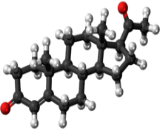Progesterone is a steroid hormone which plays an important role in the preparation for and maintenance of pregnancy. It is synthesized from cholesterol via pregnenolone, then rapidly metabolized to pregnanediol, for the most part, in the liver. The ovary and placenta are the major production sites; but a small amount is also synthesized by the adrenal cortex in both men and women. Circulating progesterone levels, which are characteristically low during the follicular phase, increase sharply during the luteal phase of menstrual cycles, reaching a maximum some 5 to 10 days after the midcycle LH peak. Unless pregnancy occurs, a steep decline to follicular levels sets in about 4 days before the next menstrual period.Progesterone is produced in the ovaries (specifically after ovulation in the corpus luteum), the adrenal glands (near the kidney), and, during pregnancy, in the placenta. Progesterone is also stored in adipose (fat) tissue.

